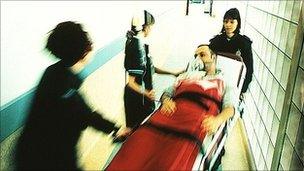PM seeks to allay fears, but insists change is needed
- Published
- comments

The NHS is under going a major revamp
The government will not take risks with the NHS in England, Prime Minister David Cameron says.
But at the launch of a new push to convince critics that the planned reforms are right, he said sticking with the status quo was not an option.
The prime minister was joined by his deputy Nick Clegg and Health Secretary Andrew Lansley to try to present a united front amid widespread criticism.
Labour has branded the pause in the progress of the bill a "PR stunt".
Speaking at a hospital in Surrey, Mr Cameron said change was necessary because of rising demands on the health service from factors such as the ageing population.
He added: "I'm in politics not to take risks with the NHS but to safeguard and improve the NHS for today and future generations.
"If we want to keep the NHS free at the point of use we have to make it more efficient - sticking with the status quo is not going to work."
Greater freedoms
He said there would be a series of events over the next two months where ministers would be meeting with the public and those working in the NHS to explain the reforms and to see if improvements could be made.
But he insisted there was support for the basic principles - putting patients and GPs in charge, reducing bureancracy and giving greater freedoms to hospitals.
The government has also enlisted Professor Steve Field, the former chairman of the Royal College of GPs, to head a panel of experts - called the NHS Future Forum - which will take a leading role in the "listening exercise".
Under the government's overhaul of the NHS, GPs are to be given control of much of the budget - allowing two tiers of management to be scrapped.
The NHS is also to be opened up to greater competition.
The government took the step of launching the "listening exercise" after Mr Lansley accepted in the House of Commons on Monday that there were concerns.
He told MPs he wanted to use a natural pause in the parliamentary timetable before the bill underpining the changes returns in late Spring to engage with people.
Speaking on Wednesday, Mr Lansley said the two-month exercise was a "genuine opportunity to shape the future of the health service".
Prime Minister David Cameron says he is listening to the concerns over NHS reform
The move has come after the government has already said it would make some changes to the plans.
Amendments have been promised to stop private health companies "cherry-picking" the easiest cases, while competition on price will not be allowed, ministers have said.
It is thought likely that in the coming months the government will make clear that the April 2013 cut-off for GPs to take on the budget is not an absolute deadline.
Instead, GP consortia that are not ready will be given support by a national board, led by NHS chief executive Sir David Nicholson.
Another measure being given serious consideration is the idea of inviting other experts to get involved in the consortia, something which has been proposed by the House of Commons' health committee.
The cross-party group of MPs said involving the likes of hospital doctors, public health chiefs and councillors would improve accountability and decision-making.
Nigel Edwards, of the NHS Confederation, which represents managers, welcomed the listening exercise, saying his members had concerns about the plans.
He said the pause in progress represented a "needed process of dialogue and communication with professionals, patients and the public".
British Medical Association leader Dr Hamish Meldrum said: "We see it as positive that the government is committed to listening. How serious it is about making real changes remains to be seen."
But shadow health secretary John Healey said he remained doubtful meaningful changes would be made, suggesting that the government had failed to listen during the official consultation and during debates in Parliament.
"The pause looks suspiciously like a PR stunt to quell the coalition of criticism."